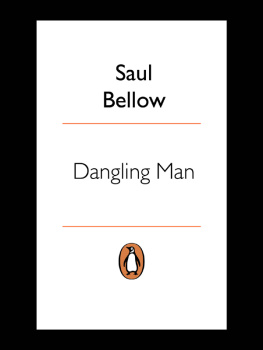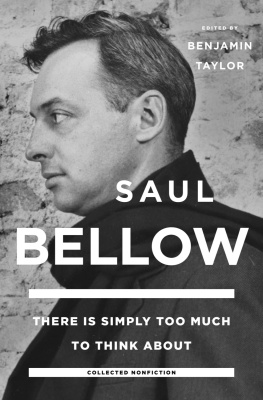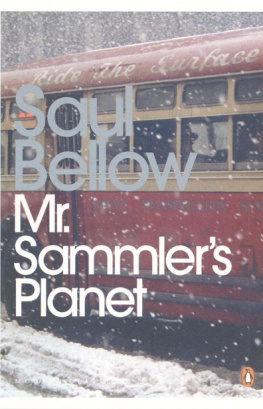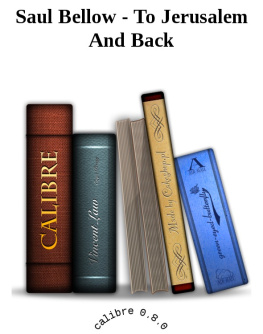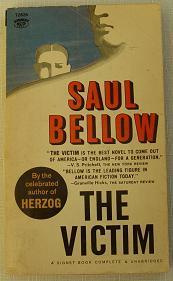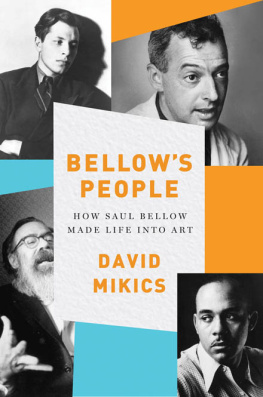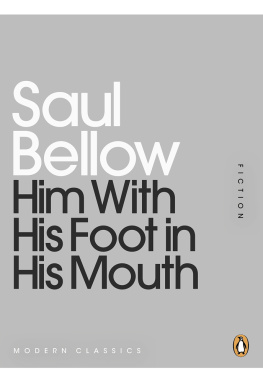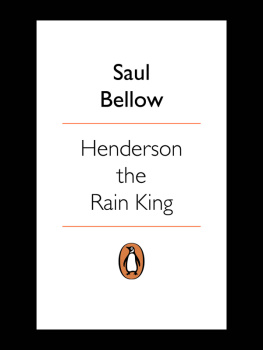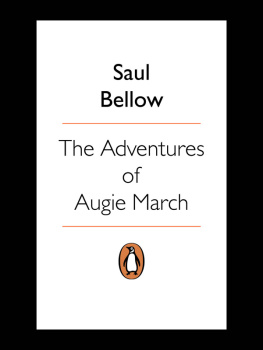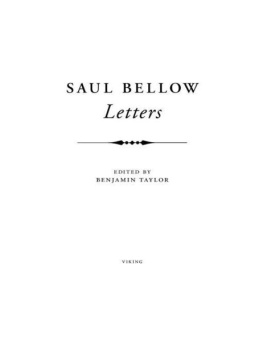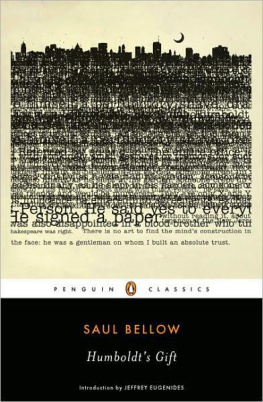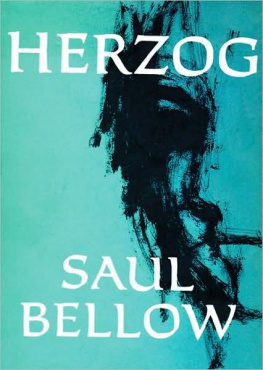Saul Bellow - Dangling Man
Here you can read online Saul Bellow - Dangling Man full text of the book (entire story) in english for free. Download pdf and epub, get meaning, cover and reviews about this ebook. year: 2013, publisher: Penguin Books Ltd, genre: Art. Description of the work, (preface) as well as reviews are available. Best literature library LitArk.com created for fans of good reading and offers a wide selection of genres:
Romance novel
Science fiction
Adventure
Detective
Science
History
Home and family
Prose
Art
Politics
Computer
Non-fiction
Religion
Business
Children
Humor
Choose a favorite category and find really read worthwhile books. Enjoy immersion in the world of imagination, feel the emotions of the characters or learn something new for yourself, make an fascinating discovery.
- Book:Dangling Man
- Author:
- Publisher:Penguin Books Ltd
- Genre:
- Year:2013
- Rating:3 / 5
- Favourites:Add to favourites
- Your mark:
- 60
- 1
- 2
- 3
- 4
- 5
Dangling Man: summary, description and annotation
We offer to read an annotation, description, summary or preface (depends on what the author of the book "Dangling Man" wrote himself). If you haven't found the necessary information about the book — write in the comments, we will try to find it.
Dangling Man — read online for free the complete book (whole text) full work
Below is the text of the book, divided by pages. System saving the place of the last page read, allows you to conveniently read the book "Dangling Man" online for free, without having to search again every time where you left off. Put a bookmark, and you can go to the page where you finished reading at any time.
Font size:
Interval:
Bookmark:
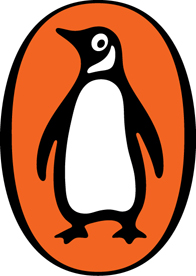
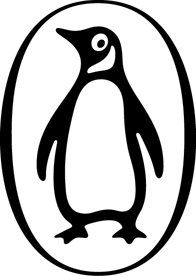


PENGUIN MODERN CLASSICS
Saul Bellow (19152005) is the only novelist to receive three National book awards, for The Adventures of Augie March, Herzog, and Mr Sammlers Planet. In 1975, he won the Pulitzer Prize for his novel Humboldts Gift. The Nobel Prize in Literature was awarded to him in 1976 for the human understanding and subtle analysis of contemporary culture that are combined in his work. In 1990, Mr Bellow was presented the National Book Award Foundation Medal for distinguished contribution to American letters. He has also received the National Medal of Arts. His books include Dangling Man (1944), The Victim (1947), The Adventures of Augie March (1953), Seize the Day (1956), Henderson the Rain King (1959), Herzog (1964), Mosbys Memoirs (1969), Mr Sammlers Planet (1970), Humboldts Gift (1975), To Jerusalem and Back (1976), The Deans December (1982), Him With His Foot in His Mouth and Other Stories (1984), More Die of Heartbreak (1987), A Theft (1989), The Bellarosa Connection (1989), Something to Remember Me By (1991), It All Adds Up (1994), The Actual (1997), Ravelstein (2000) and Collected Stories (2001).
J. M. Coetzees work includes Dusklands, In the Heart of the Country, Waiting for the Barbarians, Life & Times of Michael K, Foe, Age of Iron, The Master of Petersburg, Boyhood, Disgrace, Youth and Elizabeth Costello. Coetzee has won many literary awards including the CNA Prize, South Africas premier literary award (three times); the Booker Prize (twice); the Prix tranger Femina; the Jerusalem Prize; the Lannan Literary Award; the Irish Times International Fiction Prize; and the Commonwealth Writers Prize. In 2003, he was awarded the Nobel Prize in Literature. He lives in Australia.
Published Penguin Group
Penguin Books Ltd, 80 Strand, London WC2R 0RL , England
Penguin Group (USA) Inc., 375 Hudson Street, New York, New York 10014, USA
Penguin Group (Canada), 90 Eglinton Avenue East, Suite 700, Toronto, Ontario, Canada M4P 2Y3 (a division of Pearson Penguin Canada Inc.)
Penguin Ireland, 25 St Stephens Green, Dublin 2, Ireland (a division of Penguin Books Ltd)
Penguin Group (Australia), 707 Collins Street, Melbourne, Victoria 3008, Australia (a division of Pearson Australia Group Pty Ltd)
Penguin Books India Pvt Ltd, 11 Community Centre, Panchsheel Park, New Delhi 110 017, India
Penguin Group (NZ), 67 Apollo Drive, Rosedale, Auckland 0632, New Zealand (a division of Pearson New Zealand Ltd)
Penguin Books (South Africa) (Pty) Ltd, Block D, Rosebank Office Park, 181 Jan Smuts Avenue, Parktown North, Gauteng 2193, South Africa
Penguin Books Ltd, Registered Offices: 80 Strand, London WC2R 0RL , England
www.penguin.com
First published in the United States of America by The Vanguard Press, Inc., 1944
Published in Penguin Books 1988
This edition published in Penguin Books 1996
Published with an Introduction in Penguin Modern Classics 2007
Copyright Saul Bellow. 1944
Copyright renewed Saul Bellow, 1971
Introduction copyright J. M. Coetzee, 2007
All rights reserved
The moral right of the introducer has been asserted
ISBN: 978-0-141-38930-1
Dangling Man is a short novel in the form of a journal. The journal keeper is a young ChicagoanJosephan unemployed history graduate, supported by his working wife. He uses his journal to explore how he became what he is, and in particular to understand why, about a year ago, he abandoned the philosophical essays he was writing and began to dangle.
So wide does the gap seem between himself as he is now and this earnest, innocent past self that he thinks of himself as the earlier Josephs double, wearing his cast-off clothes.
Though the earlier Joseph self had been able to function in society, to strike a balance between his work in a travel agency and his scholarly inquiries, he was troubled by a sense of alienation from the world. From his window he would survey the urban prospectchimneys, warehouses, billboards, parked cars. Does such an environment not deform the soul? Where was there a particle of what, elsewhere, or in the past, had spoken in mans favour? What would Goethe say to the view from this window?
It may seem comical that in the Chicago of 1941 someone should have been occupied in such grandiose musings, says Joseph the journal keeper, but in each of us there is an element of the comic or fantastic. Yet he recognizes that by mocking the earlier Josephs philosophizing he is denying his better self.
Though in the abstract the early Joseph is prepared to accept that man is aggressive by nature, he can detect in his own heart nothing but gentleness. One of his remoter ambitions is to found a utopian colony where spite and cruelty would be forbidden.
Therefore he is dismayed to find himself being overtaken by fits of unpredictable violence. He loses his temper with his adolescent niece and spanks her, shocking her parents. He manhandles his landlord. He shouts at a bank employee. He seems to be a sort of human grenade whose pin has been withdrawn. What is happening to him?
An artist friend tells him that the monstrous city around them is not the real world: the real world is the world of art and thought. Joseph respects this position: through sharing with others the products of his imagination, the artist allows an aggregate of lonely individuals to become some kind of community.
He, Joseph, is unfortunately not an artist. His sole talent is for being a good man. But what is the point of being good by oneself? Goodness is achieved not in a vacuum, but in the company of other men, attended by love. Whereas I, in this room, separate, alienated, distrustful, find in my purpose not an open world, but a closed, hopeless jail.
In a powerful passage, Joseph the journal keeper links his violent outbursts to the unbearable contradictions of modern life. Brainwashed into believing that each of us is an individual of inestimable value with an individual destiny, that there is no limit to what we can attain, we set off in quest of our own individual greatness. Failing to find it, we begin to hate immoderately and punish ourselves and one another immoderately. The fear of lagging [behind] pursues and maddens us It makes an inner climate of darkness. And occasionally there is a storm of hate and wounding rain out of us.
In other words, by enthroning Man at the center of the universe, the Enlightenment, particularly in its Romantic phase, imposed impossible psychic demands on us, demands that work themselves out not just in petty fits of violence such as his own, or in such moral aberrations as the pursuit of greatness through crime (vide Dostoevskys Raskolnikov), but also perhaps in the war that is consuming the world. That is why, in a paradoxical move, Joseph the journal writer finally lays down his pen and enlists. The isolation imposed by the ideology of individualism, he concludes, redoubled by the isolation of self-scrutiny, has brought him to the brink of insanity. Perhaps war will teach him what he has been unable to learn from philosophy. So he ends his journal with the cry:
Font size:
Interval:
Bookmark:
Similar books «Dangling Man»
Look at similar books to Dangling Man. We have selected literature similar in name and meaning in the hope of providing readers with more options to find new, interesting, not yet read works.
Discussion, reviews of the book Dangling Man and just readers' own opinions. Leave your comments, write what you think about the work, its meaning or the main characters. Specify what exactly you liked and what you didn't like, and why you think so.

